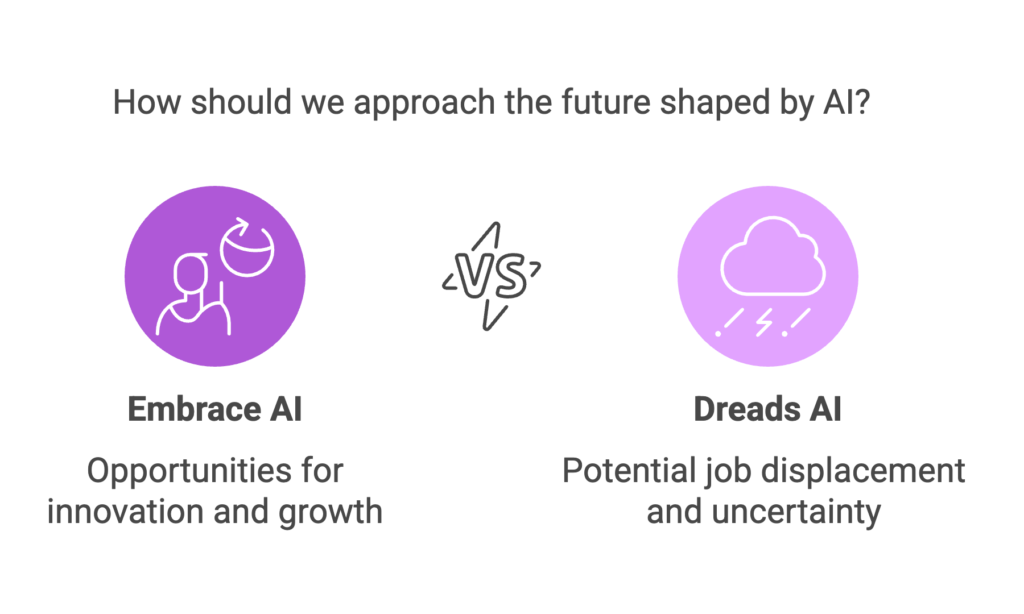Artificial intelligence and the future of work: Automation, upskilling, and new possibilities
“Am I prepared for the future?”
That’s the question many are asking themselves right now. Artificial intelligence (AI) isn’t a distant idea anymore; it’s racing like a storm on the horizon changing everything from factories to finance. It’s present. This is now. It’s changing labor as we know it.
But is this future something to embrace… or something to dread?
Let us plunge deep.

What Is Changing: Automation’s Brave New World
AI is automating thought as well as work. From legal briefs to medical diagnoses, algorithms can now outperform people in precision and speed. The first to notice the tremors are routine tasks:
- Manufacturing:- Cheaper, safer, and faster assembly by robotic arms.
- Customer Service:-Virtual assistants and chatbots manage millions of inquiries every day.
- Logistics:- Drone deliveries and self-driving trucks are no more science fiction.
A McKinsey study estimates that by 2030, automation might displace up to 800 million jobs worldwide.
Reading that may make you feel a knot of dread; you are not alone. But here is the catch: where some doors close, even more swing wide open.
Why This Is Important: Human Creativity Remains Unreplaceable
Machines excel at patterns. Still,
- They don’t dream.
- They lack empathy.
- They don’t fantasize about “what if.”
That is the priceless area people control. No machine can duplicate emotional intelligence, strategic thinking, storytelling, leadership, and ethics at a human level. Companies also badly need these skills to survive in an AI-driven environment.
The future is for those who can combine artificial intelligence efficiency with human inventiveness.
The Way Ahead: No Longer Optional Upskilling
Should you be reading this, you are already ahead of the curve. Awareness is first.
The second step? Learning more.
Concentrate on this area:
- Understanding how artificial intelligence works—even at a fundamental level—is absolutely necessary.
- Data is not useful without intelligent interpretation.
- Machines look at the past; people create the future.
- Emotional Intelligence: Teams want leaders who listen, understand, and change.
- Critical Thinking: Are you able to identify mistakes a machine could overlook? Your superpower is that.
Upskilling is not pursuing a PhD in machine learning. It means changing, flexing new muscles, and viewing technology as a partner rather than a rival.
Jobs That Did Not Exist Before
Right now, whole sectors are being created.
Jobs such as:
- AI Prompt Engineers: Creating queries that draw improved AI results.
- Making sure artificial intelligence choices are fair, open, and humane is the responsibility of ethical AI consultants.
- Augmented Reality (AR) Architects: Designing virtual worlds over our actual one.
- Overseeing fleets of AI-driven robots, robotics coordinators
- Helping individuals negotiate mental health in a hyper-automated society, digital wellness coaches
The World Economic Forum claims that, in reality, 65% of today’s elementary school pupils will be employed in positions that do not yet exist.
What seems dangerous now could be your best career decision ever.
Your Personal AI Playbook: How to Get Ready
- Accept reality , then adjust.Resisting artificial intelligence is akin to fighting 19th century electricity. Those who ride the wave are the victors.
- Make learning an investment.Lifelong learning isn’t optional anymore; short courses, certificates, podcasts, YouTube tutorials all contribute to this. It’s existence.
- Combine hard and soft skills.Indeed, technology is important. Your X-factor will be emotional intelligence and creativity.
- Develop a growth attitude.View difficulties as chances to grow. The best employment security is flexibility.
- Create a digital portfolio.Whatever your craft—writing, coding, design—show it off. Your CV won’t be all future employers will see; they will seek evidence of your ability to innovate and adapt.
Emotional Intelligence in the Artificial Intelligence Era: More Important Than Ever
At the core of it is
Algorithms are forgotten by people.
- They recall tales.
- They recall direction.
- They recall compassion.
Your best advantage in a future crowded with smart machines is being profoundly, powerfully human.
Businesses will automate duties. But they will support those who motivate, create, and link.
Final Thoughts: The Future Is Trading Up, Not Taking Away
You are not being replaced.
You are being asked to develop.
The anxiety you experience? That is the boundary of your comfort zone. Beyond it lies a world of new possibilities, new jobs, and new creative freedom.
Work does not end here. This marks the start of a new age of labor.
So, lean in. Become interested. Enroll in that course. Try things out. Fail quickly. Pick up quicker.
Tomorrow is not about perfection.
It’s about being prepared.
Your future self will appreciate the bravery you select today.
Keep in touch with DailyAIWire—your compass in the era of smart transformation.